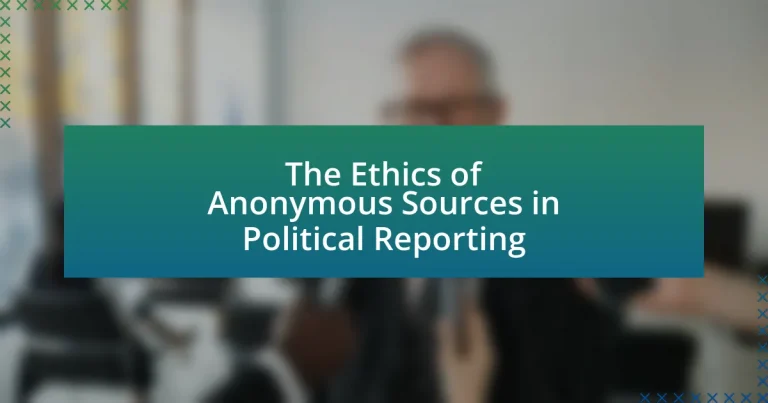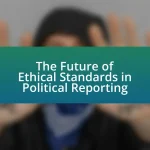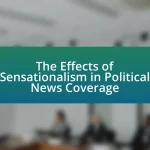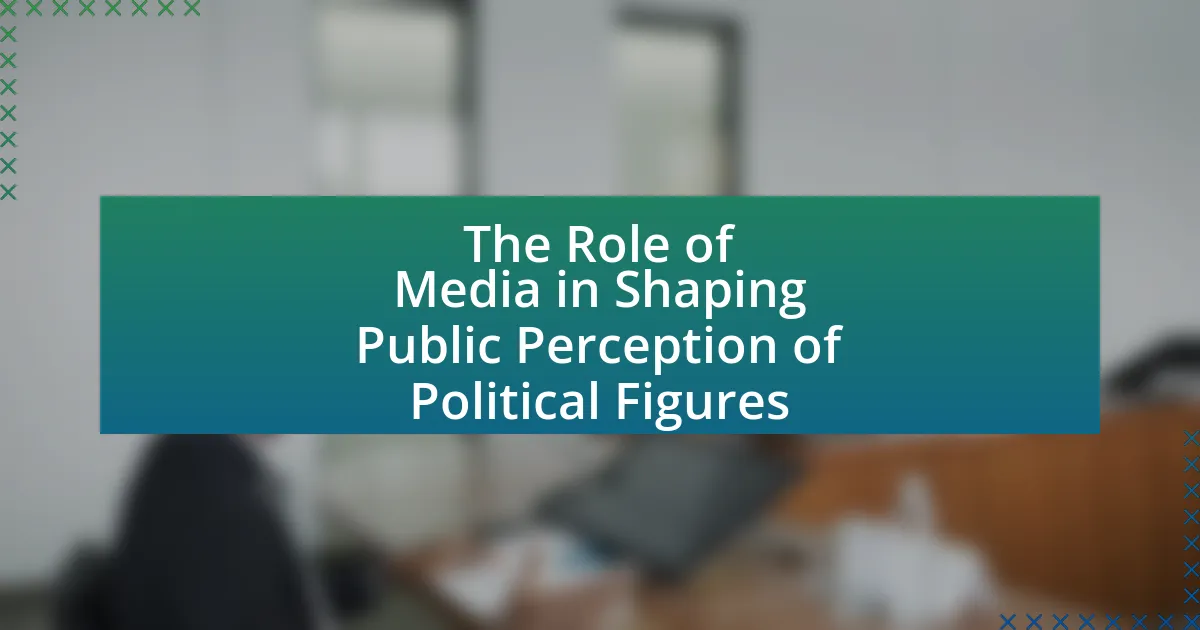The article examines the ethics of using anonymous sources in political reporting, focusing on the principles of transparency, accountability, and the public’s right to know. It discusses the rationale behind employing anonymous sources, highlighting their role in protecting individuals who provide sensitive information and facilitating whistleblowing. The article also addresses the potential risks to credibility and trust in journalism, ethical dilemmas, and the legal considerations surrounding anonymity. Furthermore, it outlines best practices for journalists to navigate these challenges while maintaining integrity and accountability in their reporting.
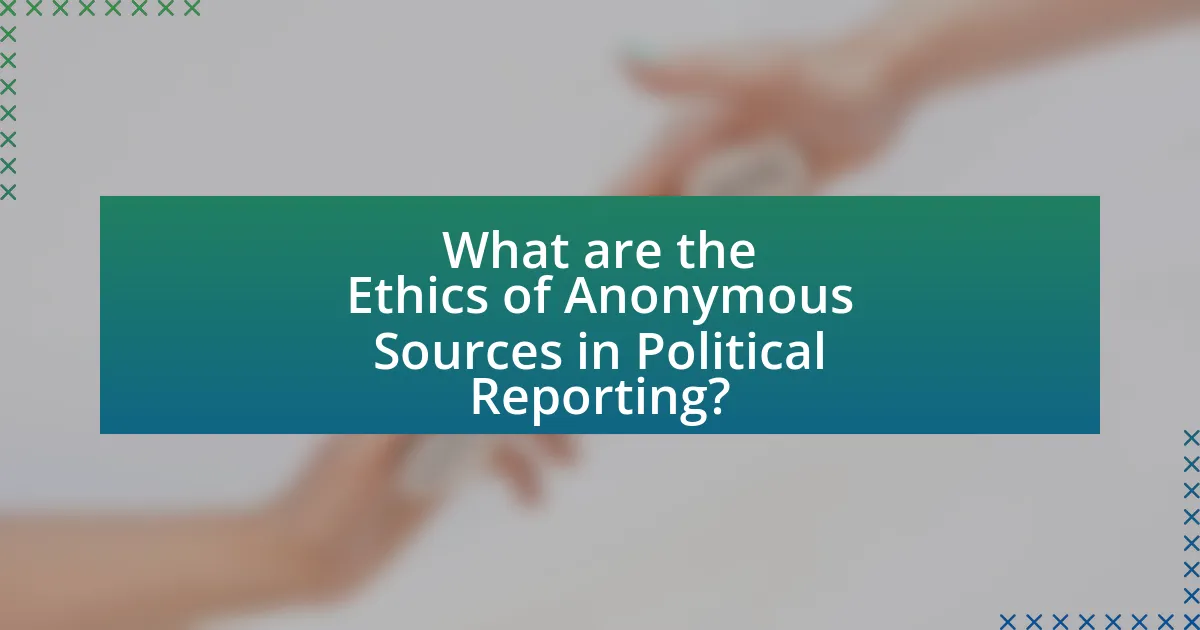
What are the Ethics of Anonymous Sources in Political Reporting?
The ethics of anonymous sources in political reporting revolve around the principles of transparency, accountability, and the public’s right to know. Journalists must balance the need for confidentiality to protect sources with the obligation to provide accurate and verifiable information. Ethical guidelines, such as those from the Society of Professional Journalists, emphasize that anonymous sources should only be used when the information is vital to the public interest and cannot be obtained through other means. Additionally, reporters are responsible for verifying the credibility of the information provided by anonymous sources to prevent the dissemination of misinformation. This ethical framework is crucial in maintaining trust between the media and the public, as misuse of anonymity can lead to a loss of credibility and increased skepticism towards journalistic practices.
Why are anonymous sources used in political reporting?
Anonymous sources are used in political reporting to protect individuals who provide sensitive information that may expose them to retaliation or legal consequences. Journalists often rely on these sources to obtain critical insights into government actions, policy decisions, or political dynamics that would otherwise remain hidden. For instance, during the Watergate scandal, anonymous sources played a pivotal role in uncovering the truth behind the Nixon administration’s misconduct, demonstrating the importance of such sources in holding power accountable.
What are the potential benefits of using anonymous sources?
The potential benefits of using anonymous sources include the protection of sensitive information and the encouragement of whistleblowing. Anonymous sources can provide journalists with critical insights that may not be disclosed otherwise due to fear of retaliation or legal repercussions. For instance, during the Watergate scandal, anonymous sources played a pivotal role in uncovering the truth, demonstrating how such sources can facilitate accountability in political reporting. Additionally, anonymity can foster a more open dialogue, allowing individuals to share information that is in the public interest without compromising their safety or career.
How do anonymous sources impact the credibility of political reporting?
Anonymous sources can significantly undermine the credibility of political reporting by introducing uncertainty regarding the accuracy and reliability of the information presented. When journalists rely on unnamed individuals, it becomes challenging for audiences to assess the validity of the claims made, as there is no way to verify the source’s motives or expertise. Research from the Pew Research Center indicates that 62% of Americans believe that anonymous sources make news less trustworthy. This skepticism can lead to a broader distrust in media institutions, as audiences may question the integrity of reporting that lacks transparency.
What ethical dilemmas arise from the use of anonymous sources?
The use of anonymous sources in political reporting raises significant ethical dilemmas, primarily concerning accountability, transparency, and the potential for misinformation. Journalists face the challenge of balancing the public’s right to know with the need to protect sources who may provide critical information under the condition of anonymity. This can lead to situations where the credibility of the information is difficult to verify, as the audience cannot assess the reliability of the source. Additionally, reliance on anonymous sources can foster a culture of secrecy, undermining trust in journalism and potentially allowing for the dissemination of biased or false information without proper attribution. The ethical implications are underscored by instances where anonymous sources have been proven unreliable, leading to public backlash and diminished trust in media institutions.
How does the use of anonymous sources challenge journalistic integrity?
The use of anonymous sources challenges journalistic integrity by undermining accountability and transparency in reporting. When journalists rely on unnamed individuals, it becomes difficult to verify the credibility of the information provided, leading to potential misinformation. A study by the Pew Research Center in 2013 found that 64% of Americans believe that the use of anonymous sources makes news less trustworthy. This perception can erode public confidence in the media, as audiences may question the motives behind anonymity and the accuracy of the reported facts. Furthermore, anonymous sources can create a lack of responsibility for the information shared, allowing individuals to disseminate unverified claims without facing consequences.
What are the implications of misleading information from anonymous sources?
Misleading information from anonymous sources can significantly undermine public trust in media and institutions. When journalists rely on anonymous sources that provide false or misleading information, it can lead to the dissemination of inaccurate narratives, which may influence public opinion and policy decisions. For instance, a study by the Pew Research Center found that 62% of Americans believe that news organizations often report inaccurate information, which can be exacerbated by reliance on anonymous sources. This erosion of trust can result in decreased engagement with news media and skepticism towards legitimate reporting, ultimately harming democratic discourse.
How do different media organizations approach the ethics of anonymous sources?
Different media organizations approach the ethics of anonymous sources with varying guidelines and standards. For instance, The New York Times requires that anonymous sources provide information that is vital to the public interest and that the reporter must have corroborating evidence to support the claims made by the source. In contrast, The Washington Post emphasizes the necessity of transparency, stating that the use of anonymous sources should be limited to situations where the information is crucial and cannot be obtained otherwise. Additionally, the BBC has a strict policy that mandates the identification of sources whenever possible, prioritizing accountability and credibility in reporting. These approaches reflect a broader commitment to ethical journalism, balancing the need for confidentiality with the responsibility to provide accurate and trustworthy information to the public.
What guidelines do major news outlets have regarding anonymous sources?
Major news outlets typically require that anonymous sources provide credible information that can be corroborated by other evidence or sources. These guidelines emphasize the necessity of transparency and accountability, ensuring that the use of anonymity is justified and not merely a means to avoid scrutiny. For instance, The New York Times mandates that reporters must explain to editors why a source requires anonymity and how the information can be verified. Similarly, The Washington Post states that anonymity should only be granted when it is essential to the story and when the source has direct knowledge of the information. These practices are designed to uphold journalistic integrity while balancing the need for confidentiality in sensitive situations.
How do these guidelines vary between organizations?
Guidelines regarding the use of anonymous sources in political reporting vary significantly between organizations based on their editorial policies, legal considerations, and ethical standards. For instance, major news organizations like The New York Times require that anonymous sources provide information that is deemed essential to the story and that the reporter has verified the information independently. In contrast, smaller outlets may have less stringent requirements, allowing for broader use of anonymous sources without the same level of verification. This variance is influenced by factors such as the organization’s mission, audience expectations, and the legal environment in which they operate, which can dictate how much risk they are willing to take in protecting sources while maintaining journalistic integrity.
What are the legal considerations surrounding anonymous sources?
The legal considerations surrounding anonymous sources primarily involve issues of defamation, confidentiality, and the First Amendment. Journalists must ensure that the information provided by anonymous sources is accurate to avoid potential defamation claims, as publishing false statements can lead to legal repercussions. Additionally, the protection of a source’s identity is often governed by state shield laws, which vary in their extent of protection, and federal law, which does not universally protect journalists from revealing sources in court. For instance, the U.S. Supreme Court has ruled that journalists do not have an absolute right to protect their sources in legal proceedings, as seen in the case of Branzburg v. Hayes (1972). Therefore, while anonymous sources can be vital for investigative reporting, journalists must navigate these legal frameworks carefully to mitigate risks.
How do laws protect journalists who use anonymous sources?
Laws protect journalists who use anonymous sources primarily through shield laws, which allow journalists to refuse to disclose the identities of their sources in legal proceedings. These laws exist in various forms across many states in the U.S., providing legal immunity to journalists against subpoenas that seek to reveal their sources. For example, the federal Shield Law, although not universally enacted, has been proposed to protect journalists at the national level, reflecting the importance of source confidentiality in promoting free speech and a free press. Additionally, court rulings, such as Branzburg v. Hayes (1972), have established that while journalists may be compelled to testify in certain circumstances, the protection of anonymous sources is crucial for investigative journalism, thereby reinforcing the ethical standards in political reporting.
What legal risks do journalists face when relying on anonymous sources?
Journalists face several legal risks when relying on anonymous sources, primarily including defamation claims, breach of confidentiality, and challenges to the validity of their reporting. Defamation claims can arise if the information provided by an anonymous source is false and damages the reputation of an individual or organization. Breach of confidentiality risks occur if a journalist reveals the identity of an anonymous source, potentially leading to legal repercussions for both the journalist and the source. Additionally, courts may scrutinize the credibility of the information obtained from anonymous sources, which can undermine the journalist’s defense against legal actions. These risks highlight the importance of careful consideration and verification when using anonymous sources in reporting.
How can journalists ethically navigate the use of anonymous sources?
Journalists can ethically navigate the use of anonymous sources by implementing strict verification processes and ensuring transparency about the limitations of the information provided. This involves corroborating the claims made by anonymous sources with additional evidence or other credible sources to establish reliability. According to the Society of Professional Journalists’ Code of Ethics, journalists should “identify sources whenever feasible” and “avoid undercover or deceptive methods of gathering information.” By adhering to these principles, journalists can maintain credibility and uphold ethical standards while utilizing anonymous sources in political reporting.
What best practices should journalists follow when using anonymous sources?
Journalists should verify the credibility of anonymous sources before using their information. This involves corroborating the details provided by the source with other evidence or information from additional sources. According to the Society of Professional Journalists, journalists must also disclose the reason for granting anonymity to ensure transparency and maintain trust with the audience. Furthermore, journalists should limit the use of anonymous sources to situations where the information is vital to the public interest and cannot be obtained through other means. This practice is supported by the ethical guidelines established by various journalism organizations, which emphasize the importance of accountability and integrity in reporting.
How can transparency be maintained while protecting sources?
Transparency can be maintained while protecting sources by implementing clear guidelines that distinguish between the need for accountability and the necessity of confidentiality. Journalists can provide context about the use of anonymous sources, such as explaining the reasons for anonymity and the potential impact of the information shared. For instance, the Society of Professional Journalists emphasizes the importance of transparency in reporting, advocating for journalists to disclose the nature of their sources when possible, while still safeguarding their identities to prevent retaliation or harm. This approach balances the ethical obligation to inform the public with the responsibility to protect individuals who provide critical information.
What are the consequences of misusing anonymous sources in political reporting?
Misusing anonymous sources in political reporting can lead to significant consequences, including the erosion of public trust in journalism. When journalists rely on anonymous sources without proper verification, it can result in the dissemination of false information, which undermines the credibility of the media. For instance, the 2003 Iraq War reporting, where anonymous sources were used to justify the invasion based on alleged weapons of mass destruction, ultimately damaged the reputation of several news organizations when those claims were proven false. Additionally, misuse can lead to legal repercussions for journalists and their outlets, as seen in cases where sources are later revealed to be unreliable or biased, resulting in lawsuits or loss of journalistic integrity.
How can the misuse of anonymous sources damage public trust in journalism?
The misuse of anonymous sources can significantly damage public trust in journalism by fostering skepticism about the credibility of reported information. When journalists rely on unnamed sources, it raises concerns about accountability and transparency, leading audiences to question the validity of the claims made. For instance, high-profile cases like the 2003 Iraq War reporting, where anonymous sources misled the public about weapons of mass destruction, resulted in a long-lasting erosion of trust in media institutions. This skepticism can lead to a perception that journalists prioritize sensationalism over factual reporting, ultimately undermining the essential role of journalism in a democratic society.
What are the potential repercussions for journalists who misuse anonymous sources?
Journalists who misuse anonymous sources may face severe repercussions, including damage to their credibility, legal consequences, and potential job loss. Misuse can lead to public distrust in the media, as seen in cases like the Jayson Blair scandal at The New York Times, where fabricated stories eroded the paper’s reputation. Additionally, journalists may encounter lawsuits for defamation or breach of confidentiality agreements, as highlighted by the legal challenges faced by reporters in high-profile cases. Ultimately, the ethical implications of misusing anonymous sources can result in long-lasting harm to both the journalist’s career and the integrity of the news organization.
What strategies can journalists employ to verify information from anonymous sources?
Journalists can employ several strategies to verify information from anonymous sources, including cross-referencing details with multiple independent sources, assessing the credibility of the anonymous source, and corroborating the information with public records or documents. Cross-referencing involves obtaining the same information from different sources to ensure consistency and accuracy. Assessing credibility requires journalists to evaluate the source’s track record, motivations, and potential biases, which can help determine the reliability of the information provided. Corroborating with public records or documents adds an additional layer of verification, as it allows journalists to confirm facts independently. These strategies are essential for maintaining journalistic integrity and ensuring the accuracy of reporting, especially in politically sensitive contexts.
